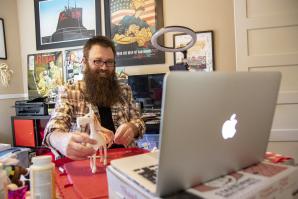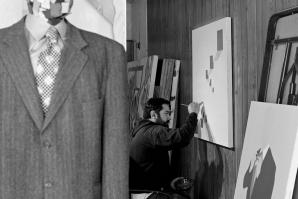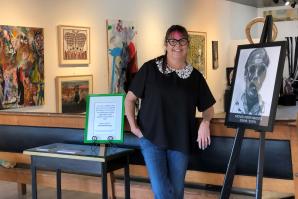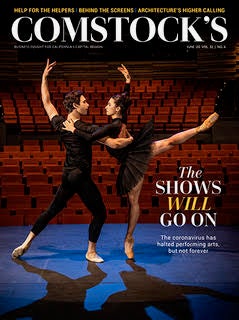On the afternoon of March 11, a tech crew at Folsom Lake College’s Harris Center for the Arts loaded in the set and costumes for the New York Gilbert & Sullivan Players’ production of “The Mikado.” It was business as usual for the active theater space. Around 10:30 p.m., a full house at the 850-seat Stage One theater gave the traveling actors a standing ovation.
About 30 minutes later, Dave Pier, the center’s executive director, read news reports that California Gov. Gavin Newsom was announcing state guidelines strongly recommending the cancellation or postponement of all public gatherings of more than 250 people through the end of March in response to the coronavirus, which had been declared a pandemic earlier that day.
“We immediately were faced with needing to alert ticket buyers, staff and the touring company about the need to cancel the matinee and evening performances of ‘The Mikado’ planned for that day, as well as 30 other events scheduled for the balance of March,” Pier says. “It happened that quickly.”
Most arts groups in the Capital Region are nonprofits operating on thin margins, and many are dependent on ticket sales to stay in business. Last year had been a strong year for the performing arts in the region, and 2020 was building on that success, which has led to hope from some local arts leaders that this progress will continue despite the unprecedented shutdown.
The Mondavi Center at UC Davis opened its 2019-20 season with a sold-out performance by John Prine (who died April 7 of complications from COVID-19). In the previous season, Mondavi presented 88 performances and sold more than 55,000 tickets, according to the organization. This season, the center was projecting more than 63,000 tickets sold for 98 performances. “The season was going very well, both artistically and in terms of attendance. It was, as is often the case with us, building momentum in the spring,” says Don Roth, the Mondavi Center’s executive director.
How people will respond once it’s deemed safe to congregate again is an open question. Roth is convinced of his audience’s loyalty and believes people will want to gather again as soon as it is safe to, but he concedes he is rethinking the 10 or so Major League Baseball games he was planning to attend this summer. Still, he’s hopeful patrons will buy tickets to the shows for the 2020-21 season. “I think that the other side of this is that people will be hungry for those live experiences,” Roth says. His many years as a presenter have shown him tickets are purchased because of previous positive experiences, but does the pandemic wipe those memories away?
Curtains Closed Abruptly
The abrupt end to live performing arts across the region was startling and shocking; nothing and no one involved in gathering large numbers of people together had experienced it or was spared. And, by March 13, there was a steady wave of announcements of cancellations and postponements.
Capital Stage, the edgy professional theater in Midtown Sacramento, canceled its production of the topical college-admission drama “Admissions.” The company had been rehearsing for six weeks and just performed its first preview; the play was scheduled to open the following week. B Street Theatre canceled its production of the play “Byhalia, Mississippi,” which had opened the previous week at The Sofia in Sacramento. Broadway Sacramento canceled the national touring production of “Bandstand,” scheduled for April 7-12 at Memorial Auditorium, and moved its major annual fundraising event, the Broadway Sacramento Gala, from April 4 to Sept. 26.
Blues guitarists Elvin Bishop and Tommy Castro were scheduled at the Crest Theatre in Sacramento on March 13. Bishop canceled, but Castro played, though SBL Entertainment capped the audience at 250. The Mondavi Center canceled Les Ballets Trockadero scheduled for that night and all events through March 21. Actors and technical staff of “Hamlet” at Sacramento Theatre Company met after that night’s performance and informed Executive Producing Director Michael Laun they didn’t feel comfortable going through with the weekend’s performances. On March 18, the Mondavi Center canceled its remaining 2019-20 season.
“You can’t pick up the phone and call somebody and say, ‘OK, when is it going to be safe for 2,000 people to collect in one building?’ There is no answer to that. Even today, there is no answer to that.”
Richard Lewis CEO, BROADWAY AT MUSIC CIRCUS
Then, on April 2, Broadway At Music Circus announced the delay of the 2020 summer season until the summer of 2021, the first postponement in the organization’s 70 years. CEO Richard Lewis and chief operating officer Scott Klier knew what they had to do. “What if, God forbid, one of your costume-shop employees came down with the virus, would you then have to quarantine your entire costume department?” Klier says. “What would be the consequence to your operation? It’s both scary and sobering, absolutely.”
The delicate balance of the company’s already compact season, producing six musicals from the ground up in three months, complicated by actors and staff traveling from across the country, gave them no choice. “You can’t pick up the phone and call somebody and say, ‘OK, when is it going to be safe for 2,000 people to collect in one building?’” says Lewis. “There is no answer to that. Even today, there is no answer to that.”
The Year Started Strong
The waiting and wondering when live performances will start again is particularly frustrating for the many regional organizations that had such positive momentum this spring.
“Things were really on a fantastic path, and artistically, the orchestra is growing and improving all the time,” says Alice Sauro, executive director of the Sacramento Philharmonic & Opera. Sauro has overseen a five-year renaissance of that organization, which canceled part of its 2014-15 season before she took over in 2015.
“We actually held our first-ever annual meeting (in 2019),” Sauro says. “We shared with our folks that we had two years in a row of balanced budgets, and we even were able to manage our expenses so well that we paid off a little bit of a carryover deficit that we had from 2017.” A report by the organization details five years of growth in tickets sold, ticket revenue, contributed revenue and number of donors. For the 2018-19 season, the organization surpassed $2 million for the first time in both operational growth and revenue growth. It’s 1,324 subscribers is a record too.
Sauro says having popular music on every program has made concerts more accessible to the general public. “That has been really a great model for us,” she says. “Within that, then we can stretch them a little bit.” The organization also made the best of being displaced by renovations to the SAFE Credit Union Performing Arts Center retrofit by giving performances at different venues around Sacramento, including Fremont Presbyterian Church and the Cathedral of the Blessed Sacrament.
Pier says the Harris Center also has been on an upward trajectory. It’s three performance spaces opened Feb. 11, 2011, and have generated approximately $10 million in impact on the local economy each year. “Our actual full last season was our best season ever,” Pier says. “Attendance was over 185,000, our sales were $7.5 million.” The center had planned a yearlong celebration of its 10-year anniversary starting this fall and flowing into 2021. The events now will be concentrated closer to early spring.
The B Street’s closing of The Sofia in Sacramento and the postponement of its theater programming for adults and families has had a domino effect. The Sacramento Ballet’s “Homegrown” program, set for March 26-29, was canceled, and a series of concerts presented by SBL Entertainment, which has booked music for the arts complex since its 2018 opening, was postponed.
The Sofia’s versatility with its 357-seat proscenium Sutter Theatre and 254-seat Mainstage Theatre has been a key reason for the upswing in performing arts in the region. In 2019, The Sofia hosted 600 events, and it was on track to surpass that this year before the ordered shutdown.
“Sacramento hasn’t had a state-of-the-art theater that size,” says Elliot Prestwich, co-owner of SBL Entertainment. “For years, we’ve been passed over as not an ‘A’ market. We’ve been considered a ‘B’ market. I’d say in the last three years that’s changed considerably.” Of SBL’s more than 190 shows regionally last year, 101 were at The Sofia (SBL also books shows at the Crest and Harlow’s Restaurant & Nightclub).
Opening up The Sophia to a variety of events was successful in bringing more people to the space. “Standalone theater’s dead,” says Buck Busfield, B Street’s producing artistic director. “If all you do is theater, you better add concerts, stand-up comedy, workshops, guest speakers, a bar, a restaurant, a pot dispensary. The market can’t handle a standalone theater.”
Busfield spent a decade building a theater space specifically suited to his company. Still, he can be circumspect about its success. “It was a certain degree of luck that the market moved toward our size venue,” Busfield says. B Street, long known for the intimacy of its space and the talent of its acting company, has been lean and nimble, with an ability to adjust quickly to circumstances.
“It’s starting to really look good,” Busfield had said March 11, just a day before he realized he would have to close. “We’re turning the best three quarters we’ve had since the 2008 recession. Now, of course, the current health scare is going to impact us, but there’s stuff more important than the arts.”
Since the closure, B Street is maintaining connections to its audiences now through email newsletters and online engagement. It uses Zoom for its Sofia Virtual Party, a series of online events that feature several of the theater company’s popular ancillary programs Wednesday through Sunday evenings. “It’s all about connecting with our family of fans,” Busfield says. “At this time, connection is what matters most.” Technology has allowed for real-time feedback that performances don’t usually receive. “We benefit most from their countless texts during our virtual offerings. In fact, they are a better forum to share in.”
The Sacramento Ballet’s 2018-19 season, the first for Artistic Director Amy Seiwert, was only its second one in the black in the past decade. Seiwert believes in “opening the door” and letting patrons experience ballet in more ways than just performances. She looks for “points of engagement” to simply let people know the ballet is here. “We have a school that trains little kids and toddlers in ballet through to professionals, but we also started a fall-prevention class for seniors,” Seiwert says. The class was so popular, another one was started to run concurrently, and then another was added on a different day. “I love that we’re thinking of the school aspect of our organization as beyond just children and as an entire community,” Seiwert says. The additional engagement boosted attendance. In the 2018-19 season, 60 percent of single-ticket buyers were new attendees to the ballet, an extraordinary figure, considering the ballet’s been in business for more than 50 years.
In response to stay-at-home orders, Sacramento Ballet has developed a program called SB @ Home that moves a number of these community initiatives online. It includes virtual classes, public online classes, activity sheets for kids and videos of the ballet company in performance.
It’s a Waiting Game
Now Seiwert and other performing arts leaders in the region wonder when audiences can return to the theaters — and if they will want to. These spaces usually overrun with activity are empty and silent. Whether it’s a small theater company such as Capital Stage or a high-profile organization such as the Mondavi Center, leadership must play a waiting game.
On April 12, Michael Stevenson, Capital Stage’s producing artistic director, optimistically announced through a Facebook video party the theater’s 2020-21 season, it’s 15th, would start Aug. 26. Originally, Capital Stage performed on the Delta King riverboat, and in 2011, the founders took over an abandoned armory on J Street and turned it into a 125-seat professional theater. This year, it was on pace to set a record with 2,300 subscribers.
“You can never do a mediocre script,” says Stevenson, who has been on the job five years. “You can do scripts that people disagree with — that’s totally possible — but the craft has to be there.” His audience trusts him, and he in turn understands their expectations. “We entertain, engage and challenge,” Stevenson says. “Staying socially relevant and politically relevant and trying to deal with present-day issues.”
The Mondavi has curated a series of virtual concerts it is sharing on dates canceled shows were scheduled to occur.
While B Street was able to secure a Small Business Administration Payroll Protection Loan that covers expenses for eight weeks, Broadway Sacramento has had to cut staff. The company let go or furloughed 13 of its full-time staff and all 15 part-time employees. The suspension of the Broadway Music Circus season means no work for the hundreds of people usually employed there, including actors, designers, musicians, stagehands, concessions workers and box office staff. “None of these decisions were based on the performances of these outstanding people and employees,” Lewis says. “They were made in consideration of the present state of the company and the forecasted months ahead.”
The SAFE Credit Union Performing Arts Center is scheduled to open in December with a Broadway Sacramento touring show. There’s hope the refurbished space, along with its updated sister Memorial Auditorium, will add to the optimism surrounding the region’s performing arts, because they offer larger options for presenting groups. It’s also expected that transitioning its ticketing to Ticketmaster, used by outside companies such as LiveNation and the Nederlander Organization, will make it a better fit for national producers.
But nothing can be for certain anymore. “We’re wired to be social and exchange information and ideas, emotions,” says Stevenson of Capital Stage. “When you remove that, it’s really a gigantic change in life. Our art form, ballet, music, art, they just depend on a live audience. It’s a critical, critical part. Here’s hoping things turn around pretty soon.”
—
Stay up to date on business in the Capital Region: Subscribe to the Comstock’s newsletter today.
Recommended For You

Photo Essay: The Arts in Isolation
How Sacramento-area artists and art businesses are creating content and engaging with the community during the pandemic
Many organizations and artists around the Capital Region, including dancers, musicians and comedians, are getting creative with technology to continue sharing their work.

Art Exposed: Manuel Fernando Rios
A West Sacramento Chicano artist confronts ethnic identity in his work
Mentored by Ricardo Favela of the Royal Chicano Air Force artist collective, Manuel Fernando Rios describes his artwork as “neo-Expressionist, neo-Chicano, mixed in with pop culture.” His solo show scheduled for May has been postponed because of the coronavirus pandemic, but he is continuing to make new work.

Creativity in Quarantine
Artists and art gallery owners in the Capital Region are finding ways to connect to the public while in isolation
As county and state orders compelled most people to remain at home, the Sacramento art world took a huge hit. However, creativity has continued to flourish in quarantine.

Help for the Helpers
Crises like the coronavirus pandemic increase stress, especially for first responders, but there are ways to cope
Under the gloom of a pandemic, people on the front lines of the crisis are encountering a level of unprecedented stressors layered onto already challenging jobs.




